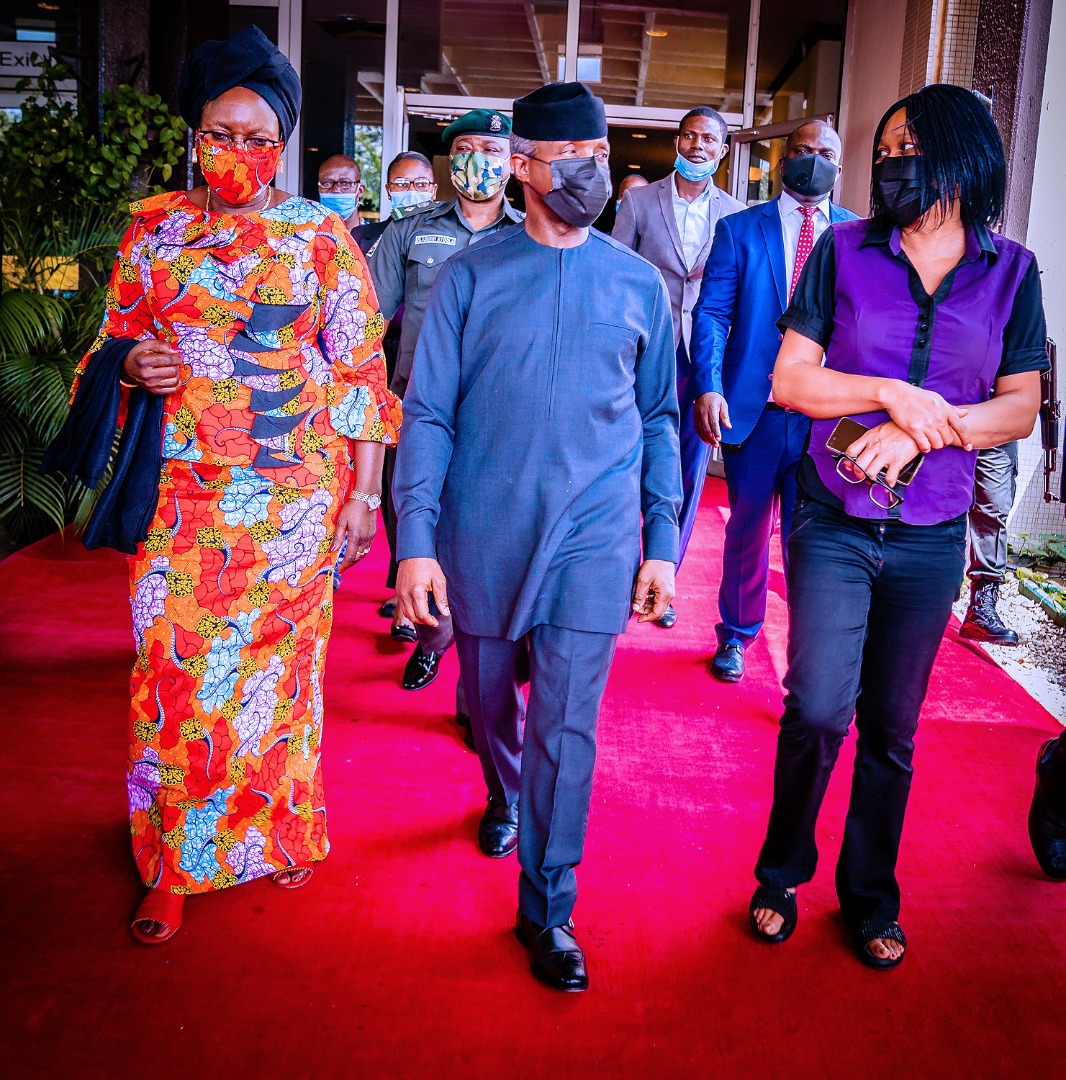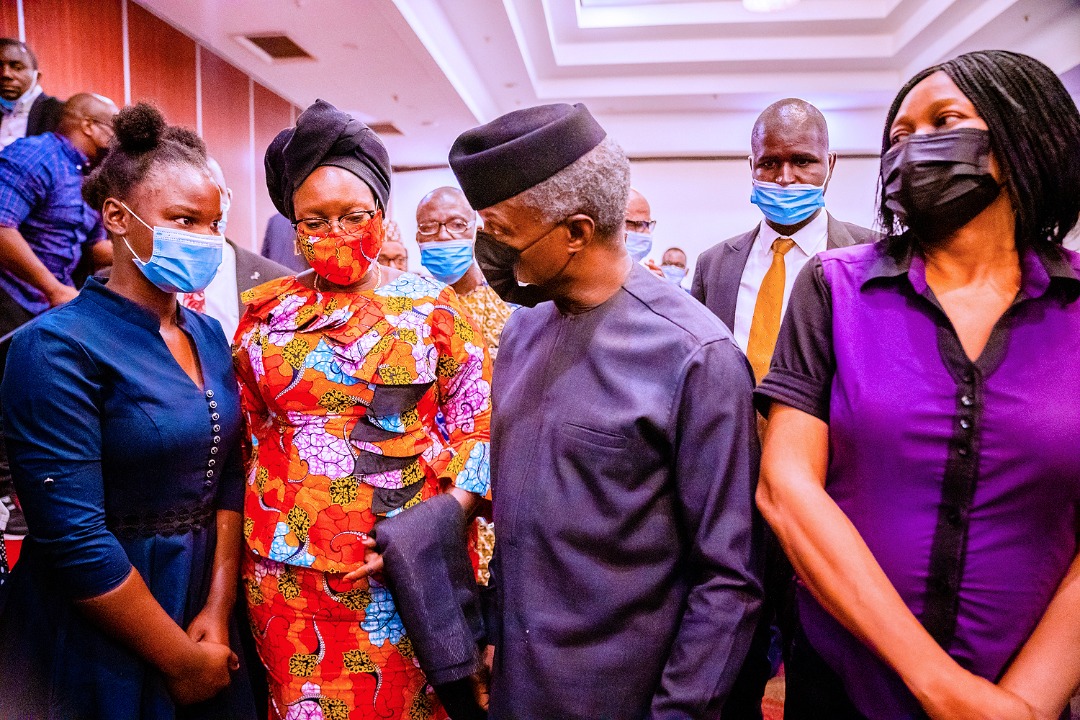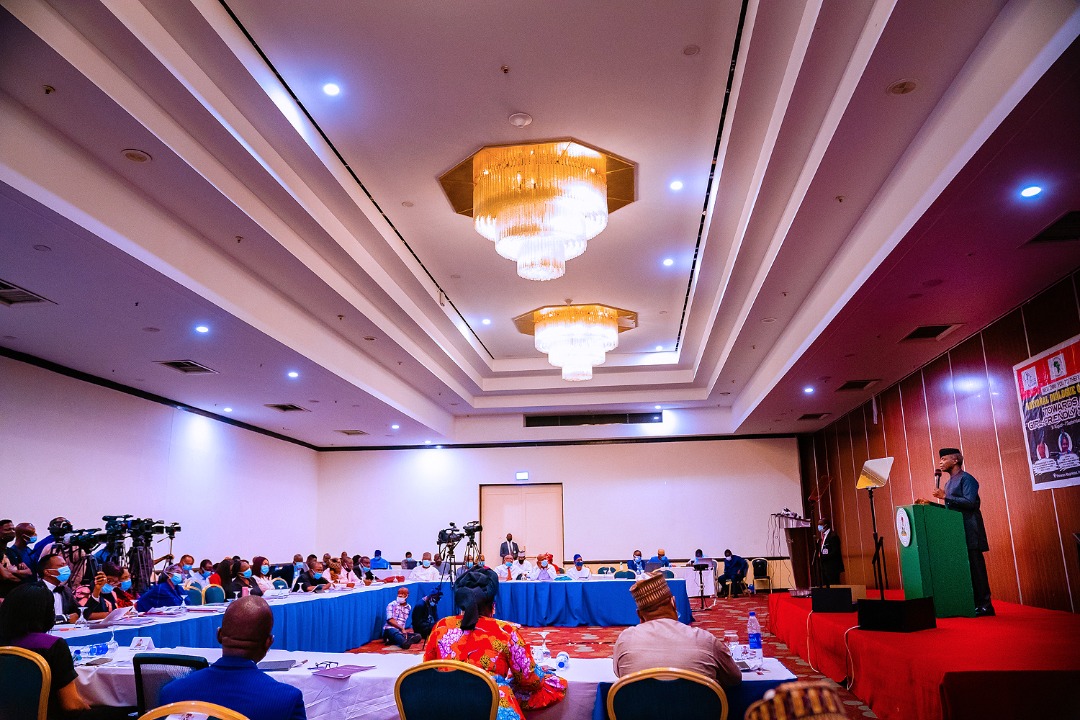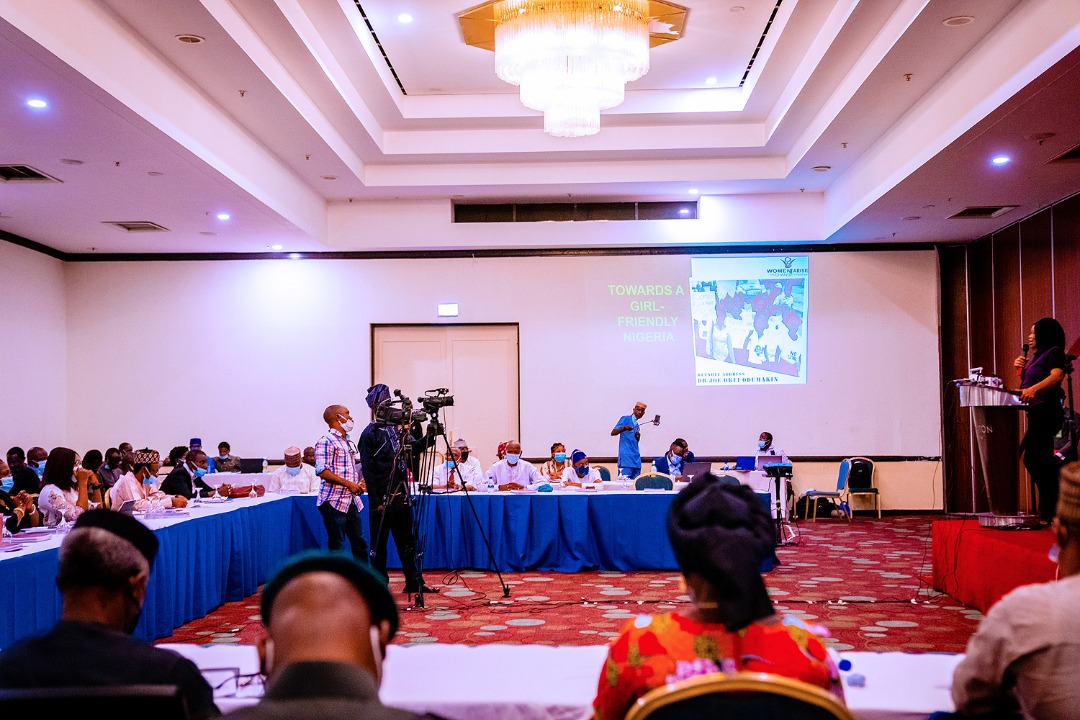National Dialogue Forum On The Girl-Child In Nigeria, Organized By African Child Policy Forum Ethiopia
REMARKS BY HIS EXCELLENCY, PROF. YEMI OSINBAJO, SAN, GCON, VICE PRESIDENT, FEDERAL REPUBLIC OF NIGERIA AT THE NATIONAL DIALOGUE FORUM ON THE GIRL-CHILD IN NIGERIA ORGANIZED BY AFRICAN CHILD POLICY FORUM ETHIOPIA IN COLLABORATION WITH WOMEN ARISE FOR CHANGE INITIATIVE, AUGUST 31, 2021
PROTOCOLS
The African Child Policy Forum Ethiopia and the Women Arise for Change Initiative and the Africa Wide Movement for Children deserve every commendation for providing the platform for this important National Dialogue on creating an enabling environment for the girl child to thrive in Nigeria.
The choice of the theme: “Towards a Girl-Friendly Nigeria” I must say is an inspired one, because it underscores the point that because of the multifaceted dimensions of the challenges that girls face in all aspects of their lives, we must adopt an all of society approach to proffering solutions.
Our thinking on these issues must be dynamic and versatile, the challenges continue to evolve and even mutate with the social pressures and conditions of every passing day.
For example, COVID-19 and the lockdowns have been empirically shown to have increased school dropouts rates for girls from low-income families, increased child marriages, adolescent childbearing, and gender-based violence. The sharp drop in income for many families here in Nigeria and in most economies of the world would mean families making choices that almost always will disfavor the girl child. Of course, female children have suffered disproportionately from the displacement and deprivation from insurgency and conflict in the Northeast. The problems are many and I will not pre-empt the dialogue by delving too widely, so I will for the next few minutes focus on what our government has endeavored to do towards creating a more girl-friendly Nigeria.
Over the years, the government has acknowledged that the best interest of a child shall be of paramount consideration in all its actions and this was demonstrated with the enactment of the Child’s Right Act of 2003, and more recently, the Violence Against Persons Prohibition Act 26 and 29 states respectively. But the States of the Federation have been rather slow in domesticating these laws. So, at the National Economic Council, the monthly meeting of governors which I have the privilege of chairing, we have made a point of working with the States to ensure that they adopt these Acts in their States. We have also put a monitoring mechanism to push the States as much as we can to get them to adopt this legislation.
This led to the creation of the Human Capital Development Unit as a special NEC project headed by a Special Adviser to track the implementation of relevant policies and laws and to track the domestication of legislation.
We have also committed in word and deed to education to ensure that no child is denied access to free basic education. We believe that free and compulsory education of girls is game-changing in many respects, as it has been empirically shown to positively impact the age of marriage, and even maternal and infant mortality.
In 2020 the Federal Executive Council approved a World Bank credit facility in the sum of $500 million to finance the Adolescent Girls Initiative for Learning and Empowerment Project. This is to improve secondary education opportunities among girls in targeted areas of participating States which are Borno, Ekiti, Kaduna, Kano, Katsina, Kebbi, and Plateau.
The project is aimed at creating safe and accessible learning spaces, advancing an enabling environment for girls, and strengthening the institutional capacity of the Federal and State governments to support girls’ education and empowerment.
The project targets girls between the ages of 10 to 20 years with a strong focus on disadvantaged adolescent girls from poor Local Government Areas with low secondary transition rates and girls from the poorest households. This intervention is projected to benefit 6.02 million girls and boys.
Since 2016, the Rule of Law Advisory Team in the Presidency has been taking a range of steps towards achieving a strong justice response in supporting women and girls.
We have formed strategic partnerships with relevant stakeholders, local and international, including the European Union Rule of Law and Anti-Corruption Programme, the Open Society Initiative for West Africa, the Cans Foundation, and Ford Foundation, all of whose commitments have proven valuable in supporting our efforts to succeed.
To ensure effective coordination of responses to cases of Sexual and Gender-Based Violence (SGBV), the Rule of Law Team supported the establishment of Sexual and Gender-Based Violence (SGBV) Response Teams across the country.
In November 2019, in an effort to enhance access to justice, we secured a toll-free emergency number and Short Code for the Federal Capital Territory – SGBV Response Team, with the generous support of Airtel, the telecoms company.
We also developed Referral Guidelines for Gender-Based Violence Response in Nigeria and a National Guide for the Establishment of Sexual Assault Referral Centres in Nigeria, to further enhance coordination.
In 2019, the President directed the National Human Rights Commission to set up a special panel to investigate cases of unlawful arrests, assault, and Sexual and Gender-Based Violence in the Federal Capital Territory following complaints of raids of nightclubs and arrests of women by the Police. The panel commenced sitting in the FCT and in the six geo-political zones, but hearings were truncated due to the 2020 COVID 19 pandemic.
The panel resumed sitting in April 2021 and I am told all hearings have been concluded. We look forward to receiving the report from the National Human Rights Commission.
First responders like the police and response teams are central to all of the efforts that we are making to address Sexual and Gender-Based Violence. As a result, we are currently supporting the implementation of projects aimed at strengthening the capacity of the Nigeria Police Force and the FCT SGBV Response Team to effectively receive, record and respond to violence against women and girls in Nigeria.
The Presidency continues to work closely with key line ministries, the police, donor partners and Civil Society Organizations to implement practical solutions, models of excellence and standardized operations that support survivors and punish perpetrators.
From 2015, we have ensured that all government social and entrepreneurial programmes have an affirmative component for women. We have done this because we believe young girls need strong role models at all levels of society
Of the 2.4 million beneficiaries of the Government Enterprise and Empowerment Programme, 1.2 million were women – that is 56.4% of beneficiaries. A total of N38billion in loans has been disbursed over the last 4 years. Of the 1.1 million beneficiaries of the Conditional Cash Transfers, 1.078million are women, over 98% of beneficiaries.
For our youth employment programme N-Power, of the 526, 000 employed, 40.4% are female, and of the 106,074 cooks in our Home-Grown School Feeding Programme, 97% are females.
We implemented a payroll support programme which was designed to mitigate income losses in the wake of the Covid-19 pandemic (part of our Economic and Sustainability Plan), and of the 307,173 employees that have benefited, 130,880 or 43% of beneficiaries are female-owned businesses. Of 94,318 Artisan beneficiaries of the programme 40,386 are female artisans over 41% of beneficiaries. Whatever the programme may be, we dedicate a certain percentage to women. And so far, 35% of our grants to MSMEs have gone to female MSME owners.
Despite these efforts, we still have a very long way to go. Not just because the numbers we have to deal with are large and the resources limited, but also because the discriminatory social, cultural practices and attitudes are deep.
This brings me to the point that while the Federal Government must remain focused and committed to advancing effective approaches to keeping girls safe and ensuring that girls are given a fair chance, it is important to emphasize that the States and local governments have an even more important responsibility. Questions of education and medical care are essentially State matters. Primary education is state and local government, the Federal Government has only about 100 schools of the hundreds of thousands of schools that there are.
Sometimes, when we talk of out-of-school-children and problems associated with education, we tend to focus on the Federal Government, whereas, the Federal Government doesn’t run primary schools, it is the business of State Governments and local governments and that has to be made clear when comparisons are drawn between Nigeria and other countries. The tendency is to assume that FG can legislate, as it were, that States should do certain things but that is not possible.
Our country has a federal system and States have their own responsibilities – they have governors, budgets that are meant to reflect the true realities of their concerns in their States. All FG does is to show a direction and give all the support they can. It is very important that States and local governments ensure that they implement gender-responsive measures that will transform the education systems and address the barriers that inhibit girl-child education. All of these must be done very actively by the States.
We are committed to ensuring that these initiatives happen to all young girls across the country, and let me convey this message through Victoria Solomon who spoke so passionately a few minutes ago, we want to let you know that we understand the difficulties that many of you have gone through and are experiencing even now, and we commend the strength and courage many of you have shown as you confront and surmount these problems.
I also want to say that the mere fact that one is a victim doesn’t mean that all hope is lost, as a matter of fact, it is very important to emphasize that despite being victims, you have every opportunity to do better in life and make great successes of yourselves.
(I want to mention in particular, a person who works with me, she is the Senior Special Assistant to the President on Legal, Compliance and Research Matters, she is my own legal adviser. Her name is Dr. Balkisu Saidu, and she is here. Dr. Balkisu was married at the age of 13 and had her first child at the age of 14. This was before she ever went to school, but today she is a Ph.D. holder and an Associate Professor of Law.)
All things are possible, and I want all the young girls to see the sorts of strong role models that are, and there are many young women doing great things in academics, entrepreneurship, despite the challenges.
I would like to commend all of the young girls and say that we are solidly behind you and we want to make sure that you are at the forefront of laws, policies and practices geared towards keeping you safe, educated, and healthy.
As deliberations continue over the days, it is my hope that all of the critical issues will be exhaustively considered. We must continue to focus on the deep, systemic dysfunction of cultures and social norms that not only enable discriminatory actions against the girl-child but also allow them to fester.
I must not fail to commend Dr Joe Okei-Odumakin for her leadership, and commitment on these issues through the years and the entire team at Women Arise for Change Initiative, who has been at the forefront of ending all forms of discrimination and violence against women and girls not just in Nigeria, but across Africa.
It is now my very special pleasure and privilege to formally declare open, this National Dialogue on the Girl-Child in Nigeria.







